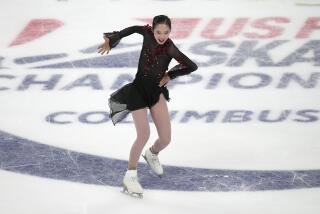But What About Michelle Kwan? : Why penalize the Torrance girl? Petition the Olympics for an exception to allow all three skaters.
- Share via
No matter what happens, Michelle Kwan is Olympic material. She and her family deserve gold medals for graciousness and good sportsmanship.
As the bizarre events unfold, the 13-year-old Torrance figure skater may yet strut her triple jumps and double axels on the Olympic ice rink in Lillehammer, Norway. But whatever the outcome, why was Kwan asked to step aside?
Earlier this month, Kwan competed in Detroit, Mich. at the U.S. Figure Skating Championships, which served as the Olympic trials. She was the youngest competitor there, with the technically most difficult freestyle program.
First- and second-place winners earn the right to go to the women’s skating competition at the Winter Olympic Games. Despite a fall during her routine, Kwan took second place to Tonya Harding.
There are only two Olympic berths in women’s figure skating this year. According to the rules, Harding and Kwan should go to Norway next month.
But the 45-member international committee of the U.S. Figure Skating Assn. asked Kwan to relinquish her rightfully earned spot. They offered Kwan first alternate and voted unanimously to offer Kwan’s berth to Olympic champion Nancy Kerrigan, the bronze-medal winner in the 1992 Olympics.
As everyone reading or watching the news knows, Kerrigan, 24, was unable to skate in the trials after she was injured by a baton-wielding assailant. Arguably, if Kerrigan had competed, Kwan probably would have come in third and cheerfully wished Kerrigan and Harding well on their Olympic journey.
Skating officials justified their decision citing Kerrigan’s favored status among experts. And Harding, 23, from Portland, Ore., was cause for high medal hopes as well. But what guarantee is there? What crystal ball says an uninjured Kerrigan would have won first or even second? All it takes is a bad fall, a crucial jump deferred or missed, a stumble, a wobble, even the insidious flu bug. In the world of competitive sports, as in life, anything can happen.
So why was Kwan asked to make the sacrifice? Why were Kwan’s dreams of Olympic competition postponable? Why should she, and not Harding or Kerrigan, be asked to wait until the next Olympics? Are Kwan’s ambitions less valued? Are they not as valid as Kerrigan’s dreams? As Harding’s dreams?
In trying to justify the decision, Kwan’s youth has often been cited--”she’ll see another Olympics.” No doubt she will. Kwan is young, intelligent, self-possessed and healthy. She’ll probably have her day to bask in the glow of the Olympic torch, if not this year then in the next Olympic year. But who can guarantee it?
And what about the potential loss to Kwan’s financial future, the thousands of dollars from possible endorsements she might have garnered, as Kerrigan or Harding undoubtedly will if they win the gold?
Was it easier to defer Kwan because she and her family would make no waves, cause no violent protest, lodge no formal complaint? And why couldn’t the U.S. committee simply petition the International Olympic Committee to expand the women’s team to include the rightful winners as well as Kerrigan.
Why penalize Kwan, who did nothing wrong except work hard, skate beautifully and make no loud protest. Can winning a medal be more important than fulfilling the promise of a young Asian-American girl?
More to Read
Go beyond the scoreboard
Get the latest on L.A.'s teams in the daily Sports Report newsletter.
You may occasionally receive promotional content from the Los Angeles Times.






